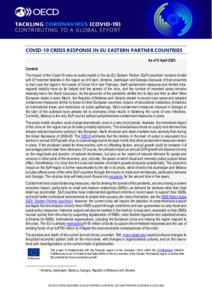
COVID-19 Crisis Response in EU Eastern Partner Countries
The outbreak of the Covid-19 crisis on public health in the six EU Eastern Partner (EaP) countries remains limited to date, yet containment and social distancing measures have had a significant economic impact, particularly on small and medium-sized enterprises (SMEs).
The OECD estimates that the decline in the level of economic output is equivalent to a decline in annual GDP growth of up to 2 percentage points for each month that strict containment measures remain in place. If the shutdown lasted for three months, with no offsetting factors, annual growth could be between 4-6 percentage points lower than otherwise. Of course, the ultimate impact on annual GDP growth will depend not only on the magnitude and duration of national shutdowns, but also on the extent of reduced demand for goods and services in other parts of the economy, and, critically, the speed at which fiscal and monetary policy support takes effect.
Initial measures already taken in the EaP range from direct financial support over fiscal measures and stabilisation packages to support for targeted sectors along with social policy measures to help employees retain part of their salaries. In addition, the EU has already reallocated €140 million of funds to support the immediate responses and the use of existing funds of up to €700 million to mitigate the socio-economic consequences of the crisis.
The attached regional note for the Eastern Partnership provides
· an overview of containment measures taken in the EaP and the initial economic impact they had on financial markets and output in key sectors;
· a mapping of policy responses introduced by EaP governments to support SMEs and help ease the negative socio-economic impacts of the pandemic;
· a menu of policy considerations for EaP governments based on measures taken by OECD and non-OECD economies to mitigate the economic impact on SMEs.